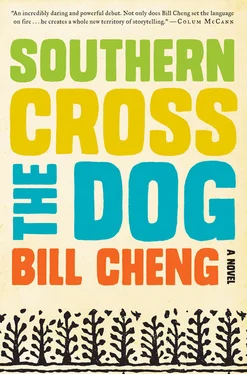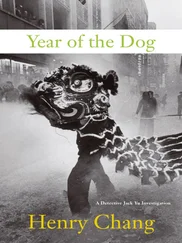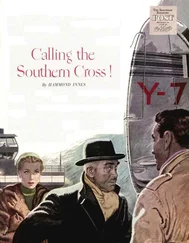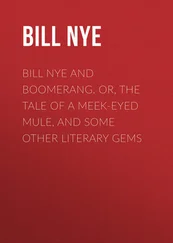Miss Lucy wants to know where the gooseberry jam is, she said.
He pointed to the shelf by the wall. She picked it up and balanced it in her hand.
You going to lunch with us?
No, he said. He didn’t recognize his own voice.
You eat already?
No, he said. Haven’t eaten.
She went to the cot and shoved his feet to the side. He could hear the crepe of her skirt rustling as she sat down.
I can bring some food down here and eat with you, she said.
Robert closed his eyes and wished for her to leave.
Why, what’s— Oh! What happened to your face!
She peeled back the blanket.
Nothing, he said.
Your eye is all swole up.
She made to touch him but he flinched.
I’m fine, he said. I just want to sleep.
For a moment she didn’t move. He waited for her to leave and when she did, he fell back asleep.
When he woke again, the swelling had gone down. He touched his cheek gingerly. It didn’t sting as bad as it had, but the skin was still raw. He sat up, staring at the ceiling. There was no light from the window. The room was all dark, save for the small bar of light underneath the door.
His right arm felt cold and strange, and he realized that he’d been lying on it. He lifted the deadweight and set it on his lap. The hand, he noticed, was made into a loose fist. He uncoiled the cold bloodless fingers, rubbing the life back into each of them.
They were coming. There wasn’t time. He worked his fingers against each other, every nerve prickling. He swung his legs off the cot and when he stood, a weight fell from his dead hand. It clattered somewhere in the anonymous dark. How long had he been holding it? Dora’s stone.
He felt around in the darkness for the dress and found it where he had left it, folded neatly beneath the cot. He packed it. He climbed up the stairs and threw open the door, the sudden light knifing into his eyes. The words were a jumble in his mouth, but he could feel it in his chest, his heart thrumming, its sharp edges cutting into tissue. He was running now, out the kitchen and into the hall. Then up the stairs, two, three, four steps at a time, his whole body vaulting forward. And as he came to the third floor, his eyes refocused, he marched down the long hall, every bedroom door shut, and did not stop till he came to Hermalie’s room.
He knocked. Hermalie, he said.
There was no answer.
He started to say it again but stopped.
There was a noise coming from inside. He was barely able to make it out. Quietly, he knelt down to the keyhole, lowering his eyes toward the brass plate. He put his hand on the floor for balance and touched on something gritty. He brought his hand up. Small white grains pressed into the flesh of his palm. He stood up slowly and looked around him, at the ring of salt circling the door.
Augustus Duke drove through the night and into the morning where dawn fire spilled out above the Luxapalila Valley. Through the saplings, he could make out the canal — a shimmering serpent of silver-black water. For days he’d been on the road, hunting throughout the state for the right instrument for his new investment — Eli — and in that time he had not slept, nor had a decent meal. The road had taken a toll physically. His back ached from the hours of driving, and his bowels were packed hard in his gut. A skin of grease lay in a sheen across his face.
And yet still his mind itched with excitement.
He had found him. He had finally found him.
There was a fortune to be made. First, here, in these hick backwaters — then up north, to the Roxy Theater, the Paramount, Carnegie Hall. He imagined the crowds they would draw — the hundred-count bodies going down the block and around the corner. From miles around they’d flock to hear him. Eli Cutter. The Singing Con. The Murdering Musico.
He’d first heard his name in a music hall in Bronzeville in Chicago. Duke was a younger man then, fresh from college. His father, Hiram, a medical doctor, had died the month before. Duke had been feeling depressed and on a whim he wandered in to hear the darkies play. The room was hot and smoke filled, the sticky residue of stale liquor underneath his soles. It was a shock when the band started up — the thrumming noise, the savage howls. He watched the Negroes as they danced, palms smacking, their eyes rolled back into their skulls. Duke sat in his chair, his hands wet with sweat.
Later that night he overheard the performers reminisce about a piano player named Elijah Cutter. They said he was a black jinx, that when you shook his hand, you could feel a bad wind move through you. Chill you to the core.
Cutter was unclean, one of the men said. Kept goofer dust in his shoes and a bag full of devils. It wasn’t natural, how good he could play, frenzying from chord to chord, from note to note.
Duke spoke up.
And where is this man now?
The performers looked at him then fell quiet.
Duke stepped out of the hall and wrote the name on the back of a matchbook. After he sold off what was left of his inheritance, he traveled for years up and down the country, the slip of cardboard in his left breast pocket. He went into the dance halls and juke joints, to the corner musicians and the traveling medicine shows, and he’d ask about the mysterious piano player, Eli Cutter.
Some said he’d been killed in a bar fight in Laredo, or that he was working on a shrimp trawler out on the Gulf, or that he had gone mad from syphilis and was locked away in some New Orleans crazy house. He chased these leads across the country, ending where he started — with a head full of tall tales and nowhere closer to finding Eli Cutter.
In the idle hours of the night, exhausted from the road, Duke would lie in bed with a bottle of rye and read through his notes. He had an age. An approximate height. Nothing firm. He would shut his eyes and feel the pressures shifting in his skull. In his mind’s eye Elijah Cutter was long and tall with fingers that stretched like spokes on a combine harvester. There was no face, no voice — just a shade without shape or form.
If he was quiet, he could almost hear the music in his blood.
Duke would pull hard from the bottle, feel its heat in his chest and his face. He could fail. He recognized this. Life on the road had not been easy. He’d already spent the bulk of what his father left him on gas and hotel rooms and booze. And with every cent that passed from his purse there was Hiram’s ghost throwing reproachful glares. Five years had passed and nothing had come from this fool venture. He might never find Eli.
And even if he did, what then?
On the road, he would turn over their meeting in his mind. The more he thought on it, the less confident he became. He could not quite understand what it was that drew him toward Eli, toward a man he never met, toward a music he’d never heard.
For Duke, Eli was an empty space, a hole that needed filling, and every story Duke had ever heard only helped in widening that hole. Elijah Cutter was a man defined by his own mystery. Everywhere Duke went, he would hear the nonsense accounts of backwater magic and hoodoo curses. He did not believe in a secret world of rewards and punishments. Only the competition of men’s wills.
One day, he drove his car out to a camp meeting. He listened to the preacher give his sermon and at the end of the services, Duke walked out of the tent and into the evening full of disquiet. There was a soup line set up out in the field, and a fight had broken out between two men.
He moved through the mob, pushing his way to the center. He saw the two battered bodies, one on top of the other. One of the men’s shirt was off and his lips were flecked with foamy spittle. He was beating the other’s head against the ground.
Читать дальше












